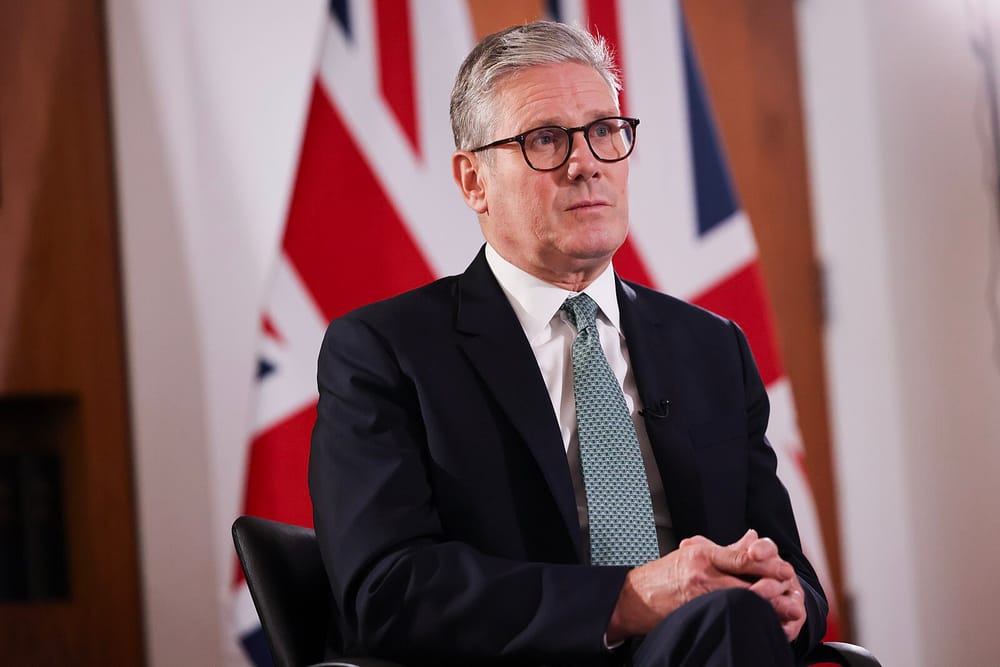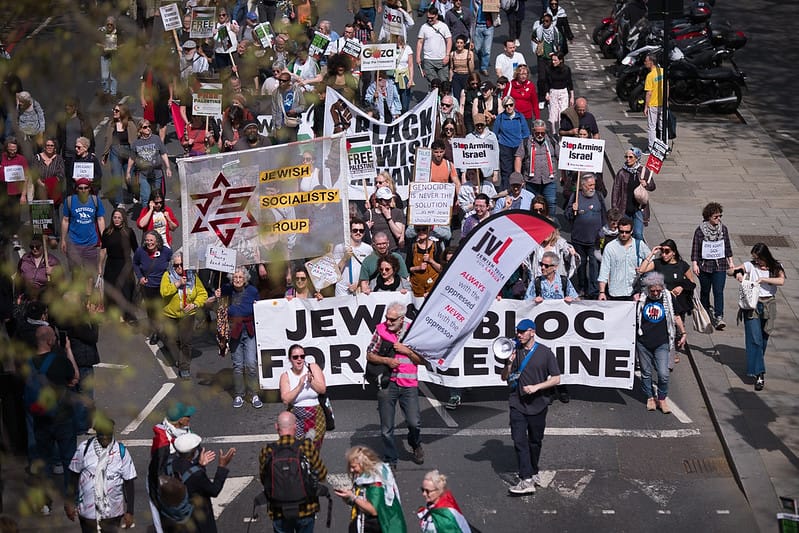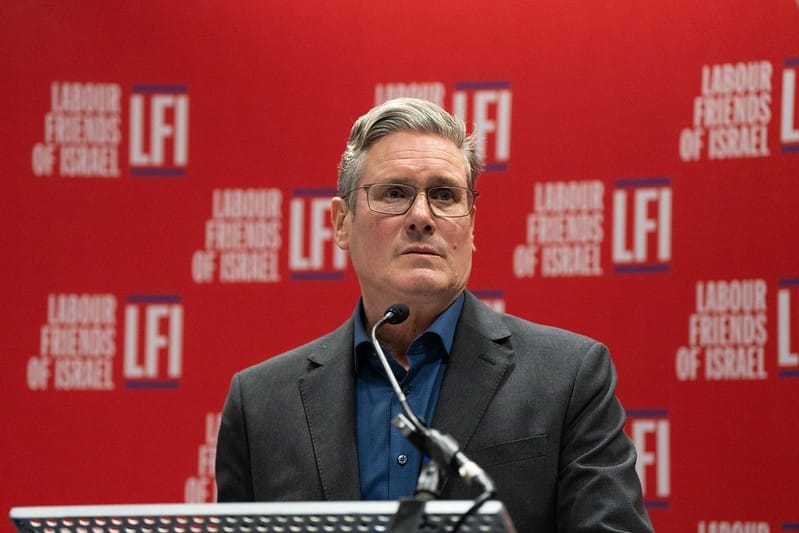Against political purity: A reply to Eli Machover
The authors of Facing antisemitism argue for embracing the shifting ground of the Jewish community.

The following is a reply to Vashti editor Eli Machover's ‘The choice is one between anti-racism and Zionism as such’. You can read Professor David Feldman, Dr Ben Gidley, and Dr Brendan McGeever's original interview, The state of anti-antisemitism, here.
How do we confront antisemitism? In January this year we published Facing antisemitism, a report commissioned by Runnymede Trust, one of Britain’s most significant anti-racist organisations. Here we examined the evidence on the state of antisemitism in Britain, including approaches to combat it. We argued that the predominant policy response, based on an alliance between mainstream Jewish organisations and the state, is not working and we laid out a different strategy, one based on the building of alliances between Jewish people and other racialised minorities. We called for Jewish people and organisations to engage in a 360-degree anti-racism, whether dealing with Britain or with Israel’s actions between the Jordan river and the Mediterranean Sea.
In Vashti, Eli Machover takes us to task. He is disappointed that our focus is on Britain and antisemitism and not on Zionism and the Palestinians; he is appalled that we don’t cast all British Jews who call themselves Zionists as irredeemable foes of an anti-racist movement; and he is unhappy that we are critical of the record of the left on antisemitism. The charge sheet not only comprises a critique of our work, it also expresses illusions which constrain a diaspora centred radical Jewish politics.
The scope of Facing antisemitism
Mirroring the pitfalls of a Zionist worldview, Machover finds our text insufficiently Israel-centric. The Runnymede Trust has not flinched from criticising the Israeli state, as well as the way its war on Gaza has impacted Muslim and other minoritised populations in the UK. For instance, its recent report on Islamophobia argues that 2024's explosion of anti-Muslim violence is linked to the ways that UK Muslim communities have been portrayed in relation to Gaza. However, Runnymede's core remit is not the Middle East but racism in Britain – including antisemitism.This is our position too. We align the effort to combat antisemitism with anti-racist struggles more broadly. Our approach places diaspora Jews front and centre.
From this basis we scrutinise prevailing efforts to combat antisemitism, focusing largely on the state and the communal mainstream, and to a lesser degree on the left. We do not dwell on the sources of antisemitism, including right-wing antisemitism — an omission that bothers Machover — because to do so wouldn’t help us answer the questions we set out to address. Instead, we turn our attention to the politics of anti-antisemitism. It is in this context that we address the left.
We explore why the anti-racist movement sometimes struggles to understand antisemitism and at times turns a blind eye to it when it appears within its own ranks. Machover’s critique is an illustration of this. He invokes the “fact” that antisemitism-related cases “constituted between just 0.06% and 0.3% of the average [Labour Party] membership” during the Corbyn years. This is bogus. As we have shown, the number of individuals dealt with by Labour’s disciplinary apparatus is not the same thing as the number of antisemitic incidents in the party, and the number of cases is not the same thing as the spread of antisemitic ideas.
Machover accuses us of ignoring Martin Forde’s independent inquiry into antisemitism in the Labour Party. In fact, we contributed evidence to Forde, some of which is quoted in his report. Forde firmly rejects “any suggestion that antisemitism is not a problem in the party, or that it is all a smear or a witch-hunt”. But this is exactly what Machover proposes.
In Facing antisemitism we refer to a piece we published in the Political Quarterly in 2020, in which we describe antisemitism as comprising a reservoir of ideas and narratives that circulate in our culture, and are drawn on by different political actors, including some who see themselves as anti-racist. We argue for a shift in focus away from individual “antisemites” as objects of zero tolerance and party discipline (a carceral approach), towards an understanding of antisemitism as a more diffuse phenomenon.
Machover rightly notes that the idea of the “reservoir” is “not developed in the report beyond its definition at the outset”, and (wrongly) echoes a point made by Joseph Finlay and David Seymour that it posits “a relatively unchanging set of discourses that influence society over generations”. As we set out in the Political Quarterly, the reservoir is far from eternal and static. Some elements drain away over time (such as the idea that Jews have horns and a distinct smell); others are repurposed (such as the notion that there is a malign Jewish conspiracy – an idea that was put to work in the blood libel but also actively informs the antisemitic critique of finance capitalism); while new elements appear over time (e.g. the obsessive quest to genetically prove that Ashkenazi Jews are descendents of Khazar Turkic converts, an idea rooted in questionable raciological pseudo-science). The idea of the reservoir alerts us to the inadequacy of counting individual “antisemites”.
The way that some within the left focus on a tiny handful of thorough-going individual “antisemites” parallels the way elite discourse prefers to blame anti-migrant and anti-Muslim hostility on a handful of easily recognisable racists, instead of reckoning with how the reservoir of Islamophobic and xenophobic narratives percolates through our politics and culture. It is a strategy that blocks the anti-racist movement’s ability to step up to the challenge of antisemitism.
Zionism and anti-racism
Springing from Machover’s Israel-centric response, he tells us that British Jews face a stark choice between anti-racism and “Zionism as such”. His argument, put simply, is that anyone who calls themselves a Zionist is a racist by definition and therefore cannot be part of the anti-racist movement.
Machover’s position conflates “Zionism” as ideology with “Zionists” as people; it conflates “Zionists” in Israel with “Zionists” in the diaspora. Some who call themselves “Zionists” in the diaspora are in denial about the actuality of Israel’s actions: a slim majority of British Jews, for example, think Israeli democracy is alive and well while 46% think that the IDF is the world’s most moral army. This helps explain why many are able to hold on to the idea that another Zionism is once again possible. But it is precisely this sort of entrenched evasion of the actuality of Israel that enables them to cleave to anti-racism in the UK without giving up their deep affective attachments to Israel as an idea or as a place. The tension between these sentiments is becoming increasingly difficult to sustain for many.
In contrast, we argue for a politics of alliance, and for the difficult work of building a heterogeneous constituency for an anti-racist movement, one that could include larger numbers of British Jews than is presently the case. This underscores a political difference that we have with Machover regarding how social change takes place.
If the goal is to pursue something that looks more like justice — both in Palestine and in the UK — then we need an analysis and a politics that leads to this outcome, not a politics of ideological purity that polices minorities and alienates people who are potential allies.
Ben Lorber, the co-author of Safety Through Solidarity: A Radical Guide to Fighting Antisemitism, captures the problem with Machover’s dismissal of “Zionists”. He writes of “one tendency within the broad umbrella of Palestine solidarity – far from the only tendency but often the loudest on social media, and the one the Right loves to focus on” that uses the term “Zionists” as “an indiscriminate identitarian category that flattens any meaningful distinction between the head of the IDF, the CEO of Boeing, or someone's grandpa.” He identifies this flattening as a “retreat from politics [which] shortcuts the hard work of consensus and movement-building in favour of the blunt instrument of grievance.” Like us, he concludes that our movements need to move beyond this, not to perform respectability, “but on principled and strategic grounds.”
As Gramsci and CLR James teach us, people always hold on to contradictory ideas, and in certain historical conjunctures those ideas can become unsettled. The opinion data we analyse in Facing antisemitism shows a Jewish population in Britain that is in motion. Machover rebukes us for using the “empty” term “non-Zionist” (“who really knows,” he asks, “what is meant by [that] term?”) — but this is precisely how a growing number of British Jews identify. Alongside the 8% of British Jews surveyed by the Institute for Jewish Policy Research (JPR) in 2022 who said they were “anti-Zionist”— rising to 10% in 2024, after the start of the current cycle of war — we find a larger number who call themselves “non-Zionist”: 15% in 2022, rising to 18% in 2024.
Among young Jews, this sign of a community in motion is even more visible: a minority of those under 29 now identify as Zionist, with 35% opting for “non-” or “anti-” and 16% ticking “don’t know”. A 2024 Union of Jewish Students survey found a slim majority identified as Zionists (52%), the remainder split between “No”, “Sometimes” and “Not sure”. Even among those who consider themselves “Zionists”, 46% said that current affairs in Israel had negatively impacted their feelings about Israel. (Both surveys, especially UJS, mainly reach affiliated members of the communal mainstream rather than radical Jews, so likely undercount the constituency for a different politics.)
As with the growing number of critical statements, however tepid, from mainstream communal commentators — the 36 members of the Board of Deputies disciplined for speaking out, among others — these developments give us grounds to think that we are in a historical moment in which key parts of the Jewish community are shifting: a moment in which the possibility of a politics of horizontal solidarity can be glimpsed.
Turning away from the “non-Zionists” or the “Not sures”, and indeed from the increasingly critical camp within those who identify as “Zionist” is a political error we cannot afford. The politics of purity, of friend and enemy, with us or against us, does not serve the anti-racist movement but undermines it.▼
David Feldman is Director of BISA at Birkbeck, University of London and a Professor of History. He has advised the UN, the OSCE, Human Rights Watch, the All-Party Parliamentary Group on Antisemitism and the Labour Party on policy issues connected with antisemitism. His most recent book is Antisemitism, Islamophobia and the Politics of Definition (2023, ed. with Marc Volovici).
Ben Gidley is a Reader in Sociology and Psychosocial Studies at Birkbeck, University of London and a member of BISA. His research has focused on diaspora and diversity in urban Europe, and on antisemitism in relation to other forms of racism. His books include: Turbulent Times: The British Jewish Community Today (2010, with Keith Kahn-Harris); Antisemitism and Islamophobia: A Shared Story? (2017, ed. with James Renton); and Jews and Muslims in Europe: Between Discourse and Experience (2022, ed. with Sami Everett).
Brendan McGeever is a Senior Lecturer in Sociology at Birkbeck, University of London and a member of BISA. His core areas of specialism include the study of racism, antisemitism and anti-racism. He is the author of Antisemitism and the Russian Revolution (2019) and Britain in Fragments: Why Things Are Falling Apart (2023, co-written with Satnam Virdee).
To donate once or monthly, click here.
Authors

David Feldman is director of the Birkbeck Institute for the Study of Antisemitism.

Brendan McGeever is senior lecturer at the Birkbeck Institute for the Study of Antisemitism.
Sign up for The Pickle and New, From Vashti.
Stay up to date with Vashti.




